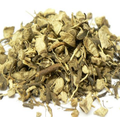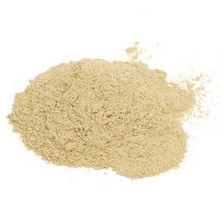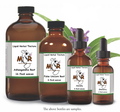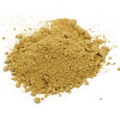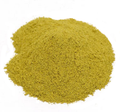 Loading... Please wait...
Loading... Please wait...- Home
- Bulk Herbs
- Herbs (A)
- Angelica Root Powder
- Home
- Herbs - Organically Grown & Wild Crafted USA
- A-B
- Angelica Root Powder
Angelica Root Powder
Product Description
Angelica Root Powder
Also Known As - Angelica archangelica, Garden Angelica, Great Angelica, and Wild Parsnip.
Organically Grown - USA
Overview - With blossoms scheduled to appear annually on the 8th of May, the feast day of St. Michael the Archangel, angelica is said to possess mystical powers against disease and evil. One reference claims this herb was named after the Archangel Raphael, who according to a 10th century French legend, revealed the secrets of this herb to a monk for use during a plague epidemic. In old-world Latvia, peasants would march into town with armloads off the fragrant herb and suddenly burst into song in languages that no one, not even the singers, understood. Like a surprising number of plants, angelica was unknown to the ancients. Although found in the northern and temperate regions of Europe and eastward all the way to the Himalayas, it does not seem to have attracted attention until the 15th century and first appeared in European herbals in the early 1500's. Its name reflects the legend that an angel revealed its special virtues to a monk during a time of plague. Angelica wasn't believed to cure the plague but protect against it; a piece of root was held in the mouth as an antiseptic. In Germany, it was known as the root of the holy ghost and was believed to eliminate the effects of intoxication and also to render witchcraft and the evil eye harmless. In England, where it was also known as bellyache root, dried angelica roots were made into powder and mixed into wine to "abate the rage of lust in young persons." The plant was also given symbolic qualities: angelica stands for magic and poetic inspiration.
Medicinal Uses - An infusion of dried root can be used as a remedy for coughs and colds, to dispel gas and to soothe intestinal cramps. Also used to stimulate kidneys. The wash is used to relieve rheumatism and neuralgia. Used as a blood tonic. Eases stoppage of urination, good for suppressed menstruation, and helps expel the afterbirth. Good for sluggish liver and spleen. A tea made of angelica, dropped into old ulcers (external) will cleanse and heal them. Good for cold, colic, flu, cough, asthma, bronchitis, menstrual cramps, pleurisy, anemia, rheumatism, and fever.
- This herb is excellent in diseases of the lungs, gout, stomach troubles, heartburn, colic, lack of appetite, dyspepsia and stomach upsets, gastrointestinal pain, gas, sciatica, and the heart. It is useful for skin lice, relieves itching, swelling, and pain. Regular users of Angelica root develop a distaste for alcoholic beverages. Chewing the root is recommended for people suffering from a hangover after excessive alcohol consumption. An infusion should be made from the leaves and chopped stems. This will also provide an excellent gargle for the treatment of sore tonsils, and throats. Angelica raw stalks are delicious when eaten with a little cream cheese, and the washed roots are also quite tasty. This plant is used to flavor many alcoholic drinks and its candied stem has long been used in confectionery.
Parts Used - Dried root
Preparation and Dosages - As a tea, in capsules and as an herbal extract.
- Decoction: use 1 tsp. root and root stock with 3/4 cup cold water. Bring to a boil, then let steep 5 minutes. Take the 3/4 cup in 2 equalparts during the day.
- Cold Extract: use 1 tsp. dried root and root stock with 3/4 cup water. Let stand 8-10 hours, then strain. Take 1 to 1 1/2 cups per day.
- Powder: take 1/4 to 1/2 tsp. three times per day.
- Extract: external; rub liquid directly on affected areas.
- Extract: internal; mix 10-30 drops of extract in liquid, take 3 times a day.
Other Uses - Recipe for genuine Angelica Liqueur, "Vespetro." 2 oz. (60 g) angelica seeds, 1/4 oz (8 g) of anise seeds, 1/4 (8 g) oz of fennel seeds, and approximately 1/5 oz. (6 g) of coriander seeds are ground together in a seed mill. 8 fluid oz. (200 g) of pure drinkable alcohol (not rubbing alcohol) is added and the preparation allowed to stand for 8 days. It is then strained through muslin and mixed with a solution of1 lb. (500 g) of sugar (preferably grape sugar) dissolved in 2 1/2 pints (1-1.5 liters) of water. (chopped angelica root may be used if seeds unattainable) Of this recipe it has been said: "There is no better or more pleasant remedy for digestive troubles or flatulence."
Precautions - Do not take Angelica if you are pregnant or have severe diabetes. Angelica has a tendency to increase the sugar in the urine.
- Angelica archangelica has been identified as a suspected carcinogen in recent years. This drug will render you sensitive to light. Use of angelica for a fairly long time, will cause contraindicate ultraviolet or tanning salon treatments as well as strong sunlight for the duration.
- Large doses can affect blood pressure, heart action, and respiration. To avoid these problems, do not exceed recommended dose.
Disclaimer - These products are dietary supplements and are not intended to diagnose, treat cure or prevent any disease. Reviews are not intended as a substitute for appropriate medical care or the advice of a physician or another medical professional. Actual results may vary among users. Mountain Maus Remedies LLC makes no warranty or representation, expressed or implied, as to the accuracy or validity of the information contributed by outside product review submissions, and assumes no responsibility or liability regarding the use of such information. The information and statements regarding the dietary supplements have not been evaluated by the Food and Drug Administration. If you have a medical condition or disease, please talk to your health care provider. If you are currently taking a prescription medication, you should work with your health care provider before discontinuing any drug or altering any drug regimen, including augmenting your regimen with dietary supplements. Do not attempt to self-diagnose any disease or ailment based on the reviews and do not use the information contained herein for diagnosing or treating a health problem or disease. Proper medical care is critical to good health. If you have a health concern or suspect you have an undiagnosed sign or symptom, please consult a physician or health care practitioner.


